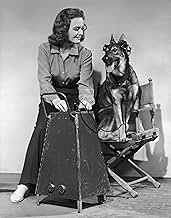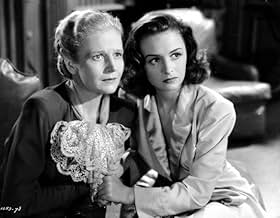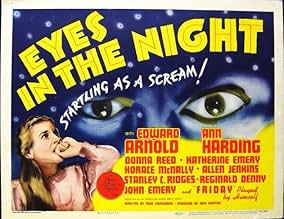IMDb रेटिंग
6.7/10
2.1 हज़ार
आपकी रेटिंग
अपनी भाषा में प्लॉट जोड़ेंA blind detective and his seeing-eye dog investigate a murder and discover a Nazi plot.A blind detective and his seeing-eye dog investigate a murder and discover a Nazi plot.A blind detective and his seeing-eye dog investigate a murder and discover a Nazi plot.
- निर्देशक
- लेखक
- स्टार
Stephen McNally
- Gabriel Hoffman
- (as Horace McNally)
Stanley Ridges
- Hansen
- (as Stanley C. Ridges)
Rosemary DeCamp
- Vera Hoffman
- (as Rosemary de Camp)
Steven Geray
- Anderson
- (as Steve Geray)
John Butler
- Taxicab Driver
- (बिना क्रेडिट के)
Edward Kilroy
- Pilot
- (बिना क्रेडिट के)
फ़ीचर्ड समीक्षाएं
What a gem of a movie! A blind detective, a Nazi plot and the smartest dog I've ever seen all make this a very enjoyable mystery/thriller. Young Donna Reed really is stunning and Mr. Arnold nails it as the blind detective. Great acting all the way around and some plot twists keep you watching. Enjoy it.
With an interesting plot, some suspenseful sequences, and a very effective performance by Edward Arnold, "Eyes in the Night" deserves to be much better known. Although its story contained a wartime message, as a whole it rises well above a mere message piece. It has numerous strong points, and not the least of them is director Fred Zinnemann, who scores a success in one of his earlier full-length features.
Arnold heads up a good cast as a blind but very resourceful detective, and he makes the character both interesting and believable. The story gives Arnold a lot of good opportunities, and he makes the most of them. The suspenseful basement sequence could almost have served as a prototype for a similar though much more elaborate sequence in the Audrey Hepburn classic "Wait Until Dark".
Ann Harding, a young Donna Reed, and Reginald Denny are also in the cast, and while they and the other characters cannot compete with Arnold, they all do a solid job. But the standout of the supporting cast is the dog 'Friday', who gets some of the best moments, and who performs very well.
The fast-paced story begins as a murder mystery, but as things slowly become clear, the last half focuses more on espionage and suspense. The story has its less plausible elements, to be sure, but it is all entertaining. It is just as good as a number of other movies from the era that are much better known, and it is well worth the time to watch.
Arnold heads up a good cast as a blind but very resourceful detective, and he makes the character both interesting and believable. The story gives Arnold a lot of good opportunities, and he makes the most of them. The suspenseful basement sequence could almost have served as a prototype for a similar though much more elaborate sequence in the Audrey Hepburn classic "Wait Until Dark".
Ann Harding, a young Donna Reed, and Reginald Denny are also in the cast, and while they and the other characters cannot compete with Arnold, they all do a solid job. But the standout of the supporting cast is the dog 'Friday', who gets some of the best moments, and who performs very well.
The fast-paced story begins as a murder mystery, but as things slowly become clear, the last half focuses more on espionage and suspense. The story has its less plausible elements, to be sure, but it is all entertaining. It is just as good as a number of other movies from the era that are much better known, and it is well worth the time to watch.
I'd never heard of this film, but discovered it bundled in with a lot of other 30s/40s B-movies in the "Mystery Classics" collection from Platinum Video. It's a surprisingly good film, really a near-great film that's hobbled a bit by it's middle act.
The first part of the film is really the only part that's a straight-forward detective romp, w/ a blind detective and his seeing-eye-dog and his hired muscle simpleton helping him sleuth out a fairly typical wrongfully-accused-murder plot. This part of the film is all golden, partially, I think, because the Detective's characters (All intended to be recurring characters in an ongoing film franchise that never quite got off the ground after this really good first chapter) feel like they have a past together, they feel like they know who they are, which is unusual for a potboiler of this era.
The second act resolves the murder a bit too quickly - in fact, it's never exactly resolved, the film merely abruptly changes focus from the detective et al to the murderers themselves discussing why they did it. This robs the film of most of it's dramatic strength, and essentially the middle act becomes little more than filler. It's entertaining enough filler - a sort of World War II version of "Wait Until Dark" - but it doesn't really advance the plot much.
The third act is the somewhat-rushed climax/resolution, though it features an unexpectedly cool shootout filmed in a very unusual style, and extended sequence with the detective's amazingly-well-trained dog. (Seriously, this dog is great! He could easily do his own taxes. He makes any other trained film dog - and really most trained film monkeys - look like idiots by comparison). On the whole, the film ends well, but it never fully recovers the momentum it lost by shifting focus in the middle, and as a result the final wrap up just comes across as slightly unsatisfying. It is, however, a more than satisfying introduction to what no doubt would have been a great detective series which, sadly, never really took off. I'm very surprised the concept was never revisited on TV or Radio, since the central character is endlessly entertaining.
One odd note: the ending feels a bit truncated, with some of the action happening off-camera. For instance, early on one of the bad guys is captured and held by the detective's men. Later on, we're shown the detective's men bound and gagged, the bad guy having evidently escaped. Later the bad guy reunites with his own people, but the transition is so abrupt that it feels like we're missing a scene or two. Also, there's a subplot in which the bad guys are hiding family information from one of their own people. This sets up what is obviously intended to be a major plot point, but, in the end absolutely nothing comes of it. Again, is this a missing scene, or simply bad writing? I can't tell.
Still and all, this is a near-classic film with a great character and some fantastic performances that unfortunately hobbles itself. Well worth a viewing, however.
The first part of the film is really the only part that's a straight-forward detective romp, w/ a blind detective and his seeing-eye-dog and his hired muscle simpleton helping him sleuth out a fairly typical wrongfully-accused-murder plot. This part of the film is all golden, partially, I think, because the Detective's characters (All intended to be recurring characters in an ongoing film franchise that never quite got off the ground after this really good first chapter) feel like they have a past together, they feel like they know who they are, which is unusual for a potboiler of this era.
The second act resolves the murder a bit too quickly - in fact, it's never exactly resolved, the film merely abruptly changes focus from the detective et al to the murderers themselves discussing why they did it. This robs the film of most of it's dramatic strength, and essentially the middle act becomes little more than filler. It's entertaining enough filler - a sort of World War II version of "Wait Until Dark" - but it doesn't really advance the plot much.
The third act is the somewhat-rushed climax/resolution, though it features an unexpectedly cool shootout filmed in a very unusual style, and extended sequence with the detective's amazingly-well-trained dog. (Seriously, this dog is great! He could easily do his own taxes. He makes any other trained film dog - and really most trained film monkeys - look like idiots by comparison). On the whole, the film ends well, but it never fully recovers the momentum it lost by shifting focus in the middle, and as a result the final wrap up just comes across as slightly unsatisfying. It is, however, a more than satisfying introduction to what no doubt would have been a great detective series which, sadly, never really took off. I'm very surprised the concept was never revisited on TV or Radio, since the central character is endlessly entertaining.
One odd note: the ending feels a bit truncated, with some of the action happening off-camera. For instance, early on one of the bad guys is captured and held by the detective's men. Later on, we're shown the detective's men bound and gagged, the bad guy having evidently escaped. Later the bad guy reunites with his own people, but the transition is so abrupt that it feels like we're missing a scene or two. Also, there's a subplot in which the bad guys are hiding family information from one of their own people. This sets up what is obviously intended to be a major plot point, but, in the end absolutely nothing comes of it. Again, is this a missing scene, or simply bad writing? I can't tell.
Still and all, this is a near-classic film with a great character and some fantastic performances that unfortunately hobbles itself. Well worth a viewing, however.
Edward Arnold plays a blind detective asked to look into the murder of an actor. Very quickly things become complicated as Arnold realizes that there are sinister forces at work that are not run of the mill.
This is a great thriller. I would love to say mystery, except that the mystery is solved about a third of the way through. Granted there are other details to work out, but the mystery is effectively over. Thats not to say you won't be sitting on the edge of your seat, you will. Arnold is an imposing figure and its a joy to watch this "helpless" man turn the tables on all of those around him. We in the audience know he's far from helpless, having witnessed the opening judo lesson, so we know whats in store for those who think they can get the upper hand on him.
The film isn't perfect. There are a few contrived bits and the end is rushed, still its 80 minutes well spent. The highest praise I can think of is if you're like me you'll probably wish there was more with this character. (Actually there is one more film, made three years later called the Hidden Eye, unfortunately that was it)
8 out of 10
This is a great thriller. I would love to say mystery, except that the mystery is solved about a third of the way through. Granted there are other details to work out, but the mystery is effectively over. Thats not to say you won't be sitting on the edge of your seat, you will. Arnold is an imposing figure and its a joy to watch this "helpless" man turn the tables on all of those around him. We in the audience know he's far from helpless, having witnessed the opening judo lesson, so we know whats in store for those who think they can get the upper hand on him.
The film isn't perfect. There are a few contrived bits and the end is rushed, still its 80 minutes well spent. The highest praise I can think of is if you're like me you'll probably wish there was more with this character. (Actually there is one more film, made three years later called the Hidden Eye, unfortunately that was it)
8 out of 10
Happened on this movie entirely by chance, while skipping through the limited offers on local daytime TV. Decided to sit it out (I'm a sucker for 1930s and 40s black-and-white films) and was very pleased I did. This movie is a thriller of sorts, and it has a major twist: it features a blind detective - quite convincingly, I must add, since he has a very smart (scene-stealing) seeing-eye dog to help him. The story has enough action, suspense, and surprises to keep the viewer interested until the very end. It isn't Hitchcock, but it's very nicely done. Recommended.
क्या आपको पता है
- ट्रिवियाThe first film in what was meant to be to be a mystery franchise focused on blind detective Duncan Maclain who solved murders with the help of his seeing eye dog, Friday. When the second entry, The Hidden Eye (1945), failed to elicit sufficient interest, MGM ended the series.
- गूफ़When the butler/enemy agent Hansen confronts Duncan MacLean loudly playing the organ in the middle of the night, Hansen ruffles his own hair to appear as if he has been sleeping and just awakened - clearly forgetting that MacLean cannot see his appearance.
- क्रेज़ी क्रेडिटFriday appears as himself.
- इसके अलावा अन्य वर्जनThere is now a colorized version available. Highly recommended as much of the film is set in the dark which doesn't register well in the b&w original.
- कनेक्शनFeatured in Personalities (1942)
टॉप पसंद
रेटिंग देने के लिए साइन-इन करें और वैयक्तिकृत सुझावों के लिए वॉचलिस्ट करें
- How long is Eyes in the Night?Alexa द्वारा संचालित
विवरण
- रिलीज़ की तारीख़
- कंट्री ऑफ़ ओरिजिन
- भाषा
- इस रूप में भी जाना जाता है
- Odor of Violets
- फ़िल्माने की जगहें
- उत्पादन कंपनी
- IMDbPro पर और कंपनी क्रेडिट देखें
बॉक्स ऑफ़िस
- बजट
- $4,33,000(अनुमानित)
- चलने की अवधि1 घंटा 20 मिनट
- रंग
- पक्ष अनुपात
- 1.37 : 1
इस पेज में योगदान दें
किसी बदलाव का सुझाव दें या अनुपलब्ध कॉन्टेंट जोड़ें
































